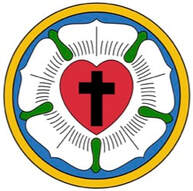 Lutheran Worship Part 4: The Kyrie King David, Jeremiah, the ten lepers, blind Bartimaeus, the father of a boy with seizures, the Canaanite woman, the two blind men: all these cried out to the Lord with the words, “Lord, have mercy.” It is a simple prayer. A prayer for deliverance from affliction, disaster, difficulty, or need. It is the prayer we pray together in the Kyrie, “Lord have mercy upon us, Christ have mercy upon us, Lord have mercy upon us,” as in Setting 3 of the Divine Service. Simply, “Lord have mercy, Christ have mercy, Lord have mercy” in Matins, Vespers, and Setting 4 of the Divine Service, or the even more prayerlike form in Settings 1 and 2 of the Divine Service, “For the peace from above and for our salvation, let us pray to the Lord. Lord have mercy, etc.”
The word “kyrie” comes from the Greek for “Lord.” The full name of this prayer is “Kyrie Eleison” which means simply, “Lord, have mercy.” This is not a penitential prayer, per se. That is, its use in the service is not as another confession of sins. We already confessed our sins at the beginning of the service and received absolution. Rather, the Kyrie is a coming before God as His people, knowing that He is merciful, and pleading for His continued merciful presence in our lives. It is a prayer “coming boldly to the throne of grace, that we may receive mercy and find grace to help in time of need.” (Heb. 4:16). The Kyrie should be sung in confidence knowing we have a strong and loving God who does indeed come to the aid of His people! “In this world of sin and death, we Christians have plenty of opportunities to join in the brief, yet all-encompassing prayer of the Kyrie: “Lord, have mercy.” All around us we see the results of hatred, envy, lust, and greed. Surely, the world is in need of God’s mercy. It’s no wonder that the church, in her worship, pleads before God on behalf of the whole world. It’s a prayer that no one else is going pray. Yet, when we cry out, “Lord, have mercy,” there is confidence in our voices because we know that God is indeed merciful. He desires to bring relief to the suffering that is all around us. Our prayer may not always bring an immediate response — at least, not the response that we are seeking — but even then, we commend ourselves and the whole world to a merciful God.” (https://www.lcms.org/worship/liturgy-parts)
0 Comments
Leave a Reply. |
AuthorWrite something about yourself. No need to be fancy, just an overview. ArchivesCategories |

 RSS Feed
RSS Feed